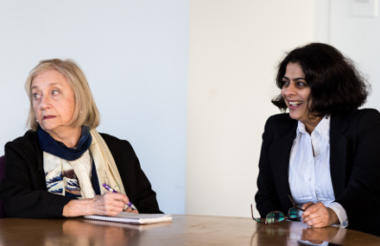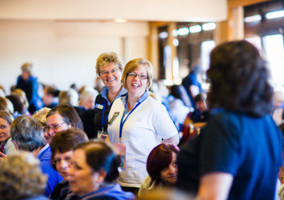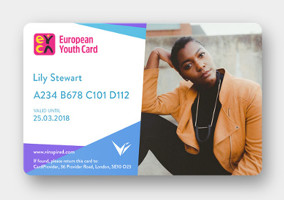There are so many talented professionals willing to volunteer their skills and they offer a great opportunity for increasing charities’ capacity, without the uncertainty and inefficiency of fundraising. But few charities really embrace this approach to resource-raising.
Reach Volunteering runs a service matching charities with volunteers willing to share their expertise, and we see a big variation in how charities use our service: many use us just for finding trustees, while some recruit an inspiring range of volunteers. To celebrate Volunteers Week I spoke to some of the charities that make most effective use of our service to learn more about their approach.
What volunteers can do for charities
Small Charities Coalition runs an advice service through which volunteer mentors provide advice for small charities in topics including fundraising, governance and strategy. They also engage volunteers to deliver projects. Their Christmas advert is a great example. It is a video that encourages people to consider giving to small charities rather than large household names. Mandy Johnson, chief executive, said: "We needed someone who was a ‘jack of all trades’ who could deliver the project end to end". The volunteer they recruited was an experienced project manager who then recruited the rest of the team: volunteers to do the filming, write the music and edit the film.
Another great example is Thames Estuary Partnership who provide a framework for the sustainable management of the Thames. They involve volunteers across the organisation in key roles such as marketing and communications. Volunteers’ roles include editor, content writer, journalist, social media manager, and database administrator.Together they run the charity’s social media, and produce their weekly email updates, their monthly newsletter and their bi-annual magazine.
Lastly, Health Action Campaign champions more action to tackle preventable illness. It has no paid staff at all so all of its research, campaigning and publications are undertaken by volunteers. For example, a multi disciplinary team of volunteer health professionals and economists produced their report exploring the tensions between business needs and mass-produced food. The Healthy and wealthy report has influenced Department of Health policy, demonstrating the huge impact of their combined efforts. Likewise, another volunteer’s research into European approaches to childhood obesity was recently referenced by the House of Commons Health and Social Care Committee.
The impact of skills-based volunteering
Skills-based volunteers enable charities to do things that they could never have otherwise even considered. Small Charities Coalition did not have a budget to hire a production team, but their volunteer not only produced the Chistmas advert but also used the footage to create another video for one of the charities which participated in the video. Thames Estuary Partnership is a great example of how you can build the kind of multipdiscplinary marketing team that small charities could otherwise only dream of. And Health Action Campaign show how you can achieve significant influence without any budget or employees at all.
This kind of volunteering can also be used to upgrade or profesionalise. Alex Conway of Miricyl (an Edinburgh based charity focused on young people’s mental health) recruited a volunteer marketer who developed an entirely new visual identity for his charity, including fonts, colour palette and logo, and has designed posters, business cards, flyers and elements of their website. “He treats us just like a paying client,” explained Alex “His ideas are always spot on, and he always delivers when he says he will – you couldn’t ask for more”
How do they do it?
I was hoping that my conversations with these inspiring leaders might distil into a few punchy ‘top tips’, but actually it seems that it all boils down to one thing: mindset. All these charity leaders talked about the importance of being flexible, responsive and open.
Mandy Johnson knew that she wanted good quality video content, and needed someone with sufficient experience to lead the whole project, but the concept of a Christmas video came through discussing the project with the volunteer.
Pat Fitzsimmons of Thames Estuary Partnership talks about adopting a collaborative problem-solving approach with volunteers from the outset, outlining the issues or objectives of the work, and asking the volunteers how they could contribute. Respecting and trusting volunteers’ expertise is a key ingredient in building successful relationships like this.
All the chief executives talk about the importance of listening to volunteers and finding out what their motivations are. They stress that people have a huge range of reasons for volunteering and that you should never make assumptions about an individual’s motivations, or what might suit them.
Michael Baber from Health Action Campaign said: “They may have applied for one role, but through conversation it becomes clear that they are better suited to another one. It’s important to be flexible and avoid tunnel vision”.
According to Pat: "The volunteers are there for a reason, and you have to find out what that reason is”. The charities then shape the volunteer opportunity accordingly. The volunteer may want to work remotely, or in the office; they may just want to stay for a short time, or form a long term relationship with the charity. The volunteer’s role may well change over time.
Sometimes a volunteer’s motivation is about tangible things like bolstering their CV and at others it is about deeper seated interests. Michael talks about tapping into people’s appetite for doing research. “Many of our volunteers enjoyed doing research at university but it is not part of their day jobs, so they are really enthusiastic about the opportunity to do research again.”
The final point that they all make is that you need to be ready and willing to support the work and provide clear direction. This kind of volunteering can add greatly to a charity’s capacity, but it does require investment and effective management to make it work.
Skills-based volunteering offers a huge opportunity to all charities, but it seems to flourish best in charities with leaders who have an open, flexible approach to resourcing, and good dose of emotional intelligence. Which sounds like the right kind of leadership for most charities.
Janet Thorne is the chief executive officer of Reach Volunteering. Reach provides a free online service connecting charities with people who want to volunteer their skills.
|
Related articles












